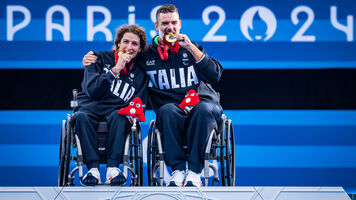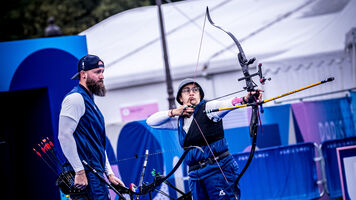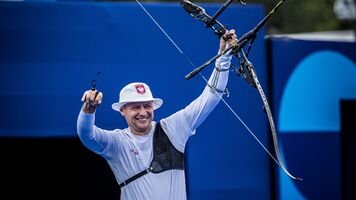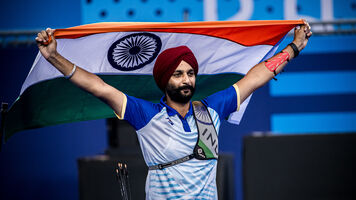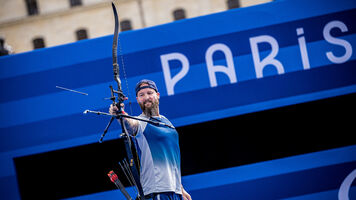Complete guide to archery at the Paris 2024 Olympic Games
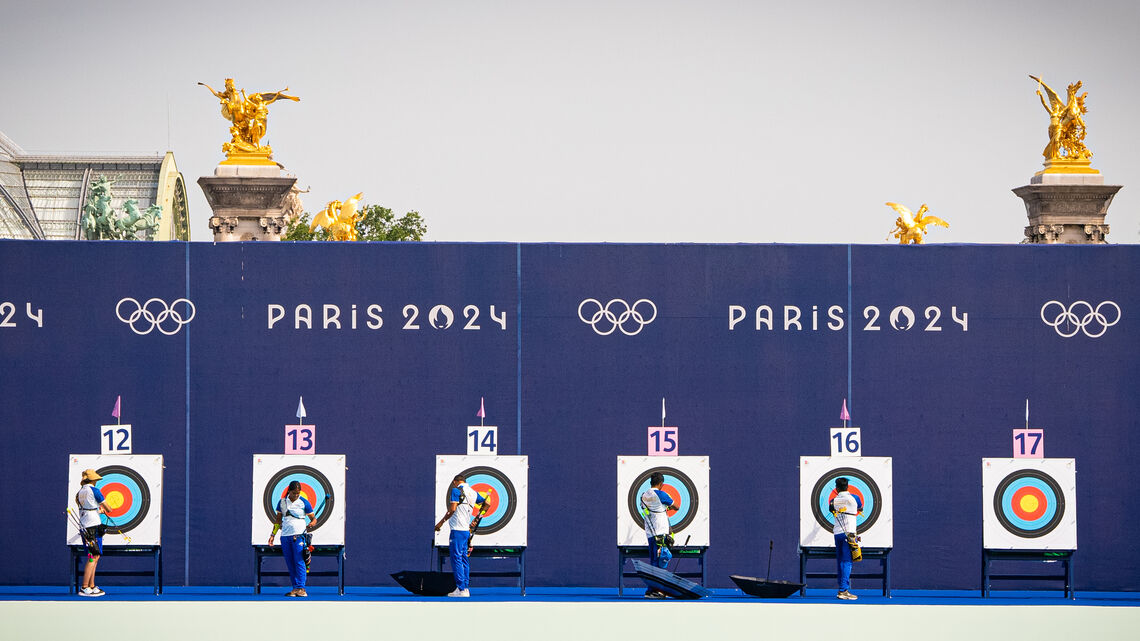
Archery returns to the Olympics at Paris 2024 with 128 athletes from 53 countries competing for five gold medals at a huge temporary arena constructed on the Esplanade des Invalides.
A staple on the programme since its return in 1972, Korea is the sport’s leading nation.
But perhaps more than ever before, there are proven contenders from across the globe – Mexico, India, Türkiye, China, Brazil and Indonesia among them – that have already beaten the Koreans on the world stage in 2024 alone.
Is this the Olympics at which Korea is finally dethroned?
Key information
What’s happening? Archery at the 2024 Olympic Games on 25 July to 4 August on the Esplanade des Invalides in Paris, France.
What’s at stake? Five Olympic Champion titles.
Who’s competing? Some 128 athletes – 64 men and 64 women – from 53 countries.
What’s the story? Crowds return to the Olympic Games in 2024 and with an imposing 8000-seat arena in the heart of the French capital, the atmosphere in Paris will be electric.
Türkiye’s Mete Gazoz, now also the world and European champion, is campaigning to become the first archer in history to successfully defend an individual title at the Games. The Korean recurve women’s team, undefeated since 1988, has a shot at a 10th consecutive victory. Parity at the top has never been greater.
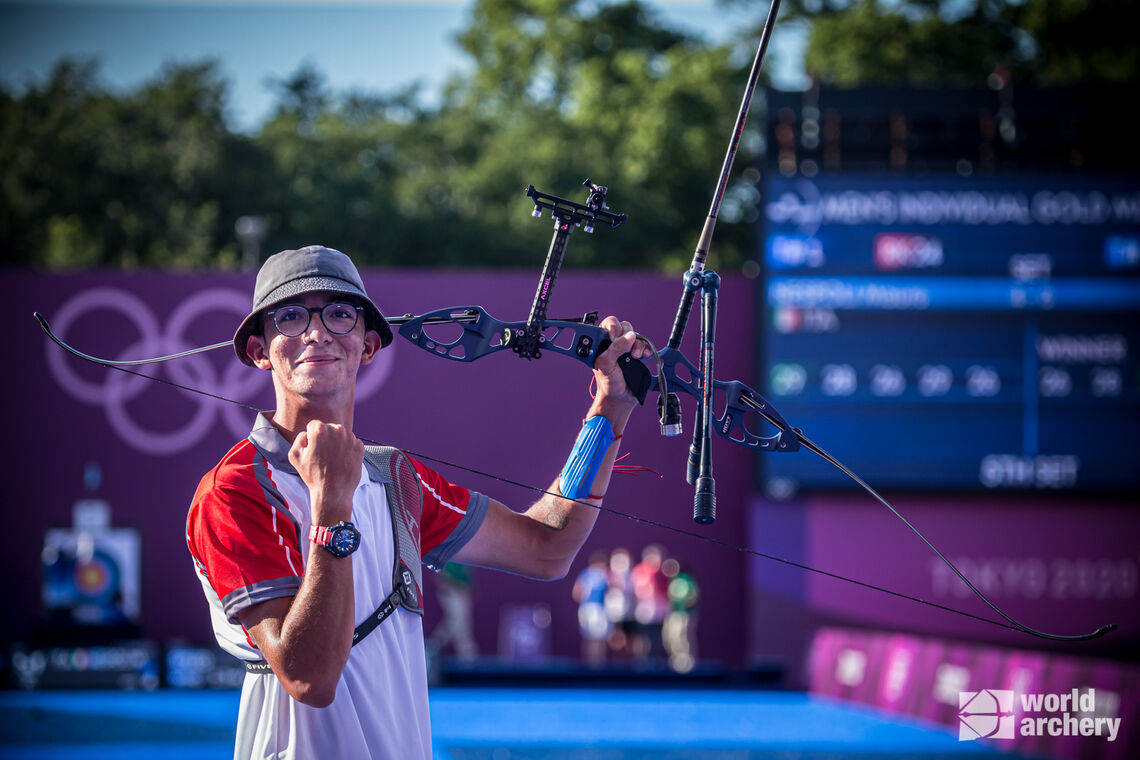
Reigning champions
- Recurve men: Mete Gazoz, Türkiye
- Recurve women: An San, Korea (not competing*)
- Recurve men team: Korea
- Recurve women team: Korea
- Recurve mixed team: Korea
*After becoming the first archer in history to collecting three gold medals at a single Olympics, winning the individual competition as well as the women’s and mixed team events, she did not make the team for Paris 2024.
Schedule
Archery at the 2024 Olympics starts before the opening ceremony of the Games on 26 July.
- Thursday 25 July – qualifying
- Sunday 28 July – women’s team finals
- Monday 29 July – men’s team finals
- Tuesday 30 July-Thursday 1 August – individual eliminations
- Friday 2 August – mixed team finals
- Saturday 3 August – women’s finals
- Sunday 4 August – men’s finals
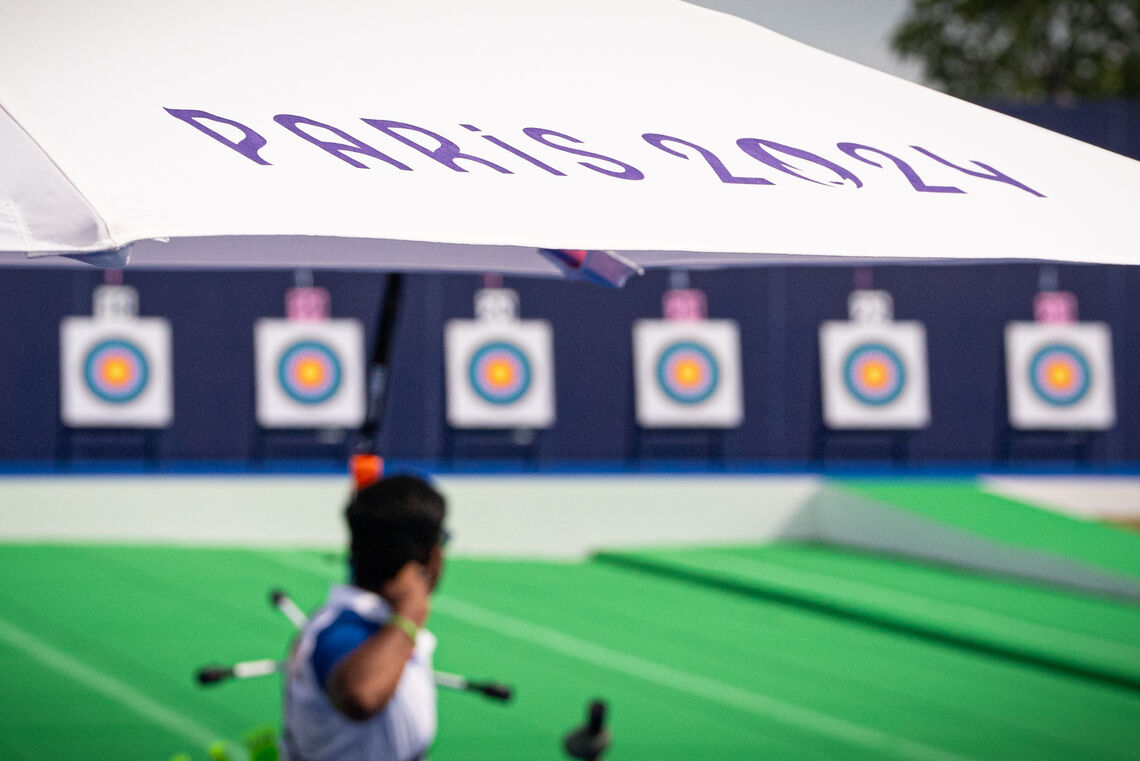
Storylines
1) The impossible task – Mete makes possible?
No archer has ever won back-to-back individual Olympic titles. Only one archer has ever won two – Darrell Pace in 1976 and 1984. After An San missed the Korean team, only Mete Gazoz returns as a defending champion and has a shot at breaking this particular barrier in Paris.
“I’m coming to my first Olympics in Paris to win the Olympics for the first time,” he said recently.
It’s indicative of the hungry, focused mindset that has already seen Gazoz become a trailblazer. Türkiye’s first Olympic archery medallist, he won the World Archery Champion in 2023 – and then became the first archer in history to hold the Olympic, world and European titles at the same time in 2024.
He could do it.
2) The home team.
France hired former Korean head coach Oh Seon Tek to deliver a medal at these home Olympic Games. His work with the squad has been outstanding, with both teams arriving as reigning European Champions.
At 17 years old, Baptiste Addis is the youngest man representing France at these Olympics – across all sports. Talented, young and hungry, a fairytale ending is possible – but he’ll have to earn it.
3) Korea’s women have never lost a team match at the Games.
Team competitions were introduced to the Olympic archery programme in 1988 – Korea won there, on home soil in Seoul, and haven’t lost since. That’s nine consecutive gold medals.
The goal with every arrow in archery? Ten points.
The goal for the Korean women’s team in Paris? A 10th Olympic title. But the team sent here to achieve it – Lim Sihyeon, Nam Suhyeon and Jeon Hunyoung – are rookies at the Games. A four-decade legacy rests on the shoulders of three archers with very little experience.
And China – having already beaten Korea twice in 2024 – is circling.
Equipment and format
Archers at the Olympic Games use recurve bows and compete in the discipline of target archery.
The competition features individual, mixed team and team events. A mixed team consists of two archers, one man and one woman and a team consists of three archers of the same gender from the same nation.
Only 128 archers compete at the Games. Spots had to be qualified.
Only 12 teams compete at the Games. Nations who qualify a team also qualify three individuals. Any nation that has at least one male and one female quota place is also eligible for the mixed team event.
Archers shoot over a distance of 70 metres at targets measuring 122 centimetres in diameter, aiming to hit a 10-ring measuring just 12.2 centimetres in diameter – or about the size of an orange.
The qualifying phase of the competition, which takes place on 23 July and consists of 72 arrows scored cumulatively, is used to seed the archers for the matchplay phase.
Archers, teams and mixed teams then shoot through head-to-head brackets, in which the winner of each match advances and the loser is eliminated until a champion is crowned. Matches at the Olympic Games are decided using the set system.
Matches: Set system
Archers and teams shoot series of arrows called ‘sets’. The highest score in a set is awarded two set points. A draw awards one set point each.
The goal in an individual match is to accrue six set points. A set consists of three arrows.
The goal in a mixed team match is to accrue five set points. A set consists of four arrows, two per archer. (A mixed team consists of one male and one female archer.)
The goal in a team match is to accrue five set points. a set consists of six arrows, two per archer. (A team consists of three archers of the same gender.)
If an individual match is tied at five set points after five sets, the match goes to a tiebreak. Each archer shoots a single arrow. The arrow that lands closest to the middle of the target wins the match.
If a mixed team or team match is tied at four set points after four sets, the match goes to a tiebreak. Each archer shoots a single arrow. The mixed team or team with team with the highest score wins the match. If the scores are tied then the mixed team or team with the arrow closest to the middle of the target wins the match.
The loser of a match is eliminated. The winner advances to the next phase of the bracket.
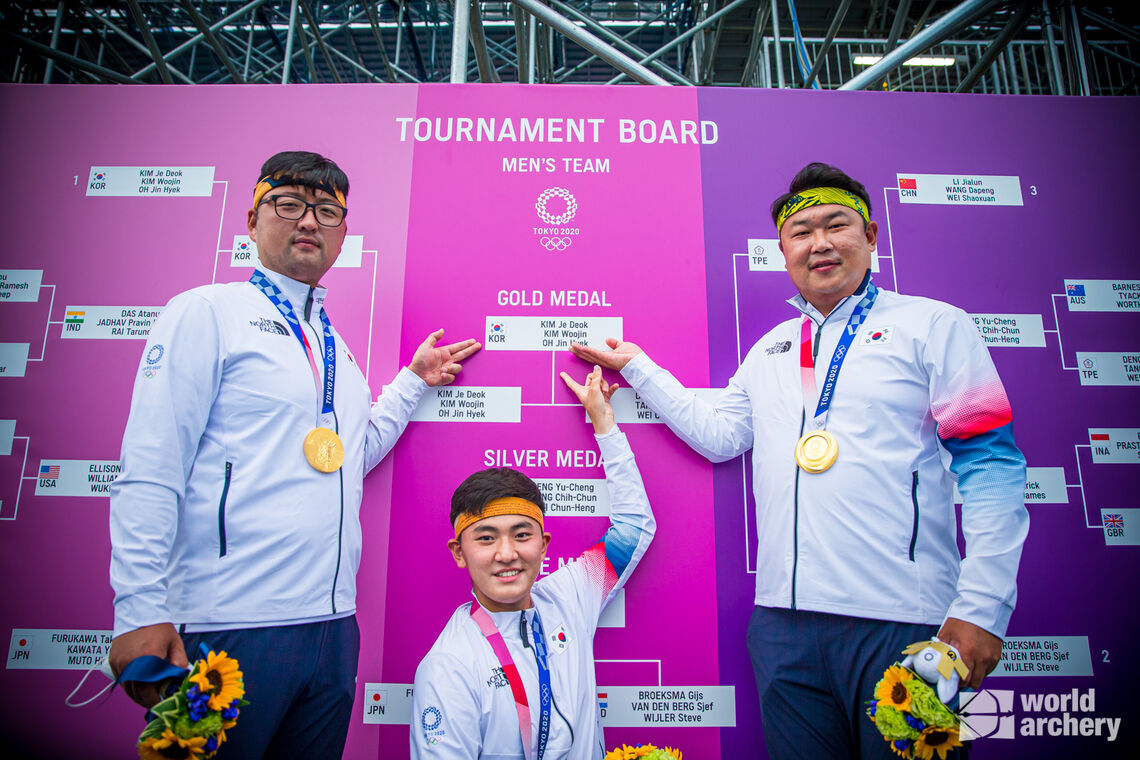
The line-up
These are the nations that will contest each of the five gold medals. The full entry list of athletes is available in the Paris 2024 Olympic Games section of the World Archery website.
Mixed team (16 qualify for matchplay): Australia, Brazil, Canada, China, Chinese Taipei, Colombia, Czechia, Egypt, France, Germany, Great Britain, India, Indonesia, Israel, Italy, Japan, Korea, Mexico, Moldova, Netherlands, Slovenia, Spain, Türkiye, Ukraine, USA, Uzbekistan and Vietnam. (27)
Women’s team: China, Chinese Taipei, France, Germany, Great Britain, India, Indonesia, Korea, Malaysia, Mexico, Netherlands and USA. (12)
Men’s team: China, Chinese Taipei, Colombia, France, Great Britain, India, Italy, Japan, Kazakhstan, Korea, Mexico and Türkiye. (12)
Women: Australia, Austria, Azerbaijan, Brazil, Canada, China, Chinese Taipei, Colombia, Czechia, Denmark, Egypt, Estonia, France, Germany, Great Britain, Guinea, India, Indonesia, Iran, Israel, Italy, Japan, Korea, Malaysia, Mexico, Moldova, Netherlands, Poland, Puerto Rico, Romania, San Marino, Slovakia, Slovenia, Spain, Tunisia, Türkiye, Ukraine, USA, Uzbekistan and Vietnam. (40)
Men: Argentina, Australia, Bangladesh, Bhutan, Brazil, Canada, Chad, Chile, China, Colombia, Cuba, Czechia, Egypt, El Salvador, Finland, France, Germany, Great Britain, India, Indonesia, Israel, Italy, Japan, Kazakhstan, Korea, Luxembourg, Mexico, Moldova, Mongolia, Netherlands, South Africa, Slovenia, Spain, Türkiye, Ukraine, USA, US Virgin Islands, Uzbekistan and Vietnam. (40)
Trivia
Marcus D’Almeida (Brazil) and Casey Kaufhold (USA) are the world number ones arriving at the Paris 2024 Olympic Games. Brazil has never won an Olympic archery medal, while a US woman has not taken individual gold since 1976.
Korea is archery’s most successful nation at the Games. The country’s recurve women’s team are unbeaten and they will attempt to win a 10th consecutive title in 2024.
No archer has ever won back-to-back individual Olympic titles. Mete Gazoz (Türkiye) returns to defend his title. Recurve women’s winner An San did not make the Korean team after becoming the first archer to ever win three gold medals at a single Olympics in Tokyo.
The qualifying round will take place earlier than normal, one day before the opening ceremony, and the first medal will be awarded two days after the Games begin. This is because Invalides is next to the river Seine, which will host the opening ceremony, and the venue is being shared with cycling (and marathon).
Barcelona 1992 Olympic Champion Sébastien Flute (France) is responsible for organising the competition.






